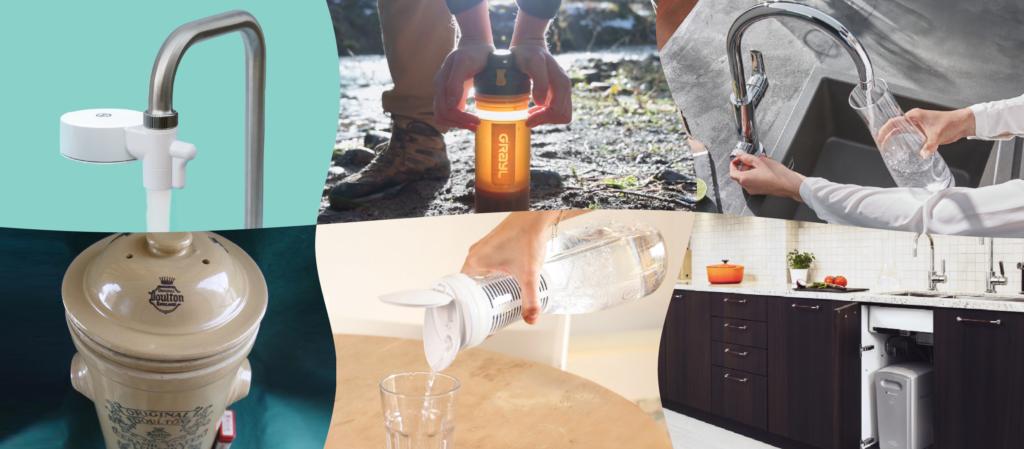Our top water filter pick is the AmaxonBasics AMZB-G30CW Filtration system (view on Amazon). If you’re in the market for a pitcher system, consider the PUR Classic 11 Cup Water Filter Pitcher (view at Amazon).
What to Consider When Buying a Water Filter
Thinking about why you want a water filter before you buy is important, because it will help you decide which one is the right one for you. If you drink most of your water from a water bottle and don’t want to spend a lot, but still want to ensure clean, tasty water, a filtered water bottle is ideal. If you are just concerned about the flavor of your drinking water and want to filter out any extra chemicals you drink and maybe cook with, your simplest, and least expensive option is a countertop or pitcher unit. The next level up—but not by much in terms of effort—for the same purpose would be an in-door refrigerator unit that connects to your ice maker, too.
If you want all the water you use from your kitchen sink—for cleaning veggies, drinking, and using in recipes, as well as the convenience of not cluttering up your fridge or countertop with containers (and not having to fill up your pasta pot from an inconvenient fridge spigot), and under-sink unit is the way to go.

Finally, if you want to filter all the water you use, from water you may drink from bathroom sinks in the middle of the night, to the water you shower or take a bath in, a whole-house filter is what you need. This would especially make sense if you have hard water that needs softening. The impacts of the energy and materials that go into water softening can be offset by longer appliance life, more washes before clothing goes gray and less detergents needed for effective cleaning.
FAQ
Are Reverse Osmosis filters sustainable?
We’re not recommending Reverse Osmosis filters due to the fact that on average, they use about 4 gallons of water for every 1 gallon they filter. The extra water is considered waste water. Considering that freshwater resources are limited or very limited in many parts of the US and the world, it’s just not a responsible or sustainable choice.
In addition, reverse osmosis filters don’t offer any significant advantage over other types of filters, they are slow to filter water compared to the other types of filters listed here, and they take up quite a lot of space to do the job—they need a several-gallon holding tank.
How do I know if I need a water filter?
Before you buy any water filter, check your local water supply—you might not need one. Assuming you need a filter because other people have them is not a scientific way to determine what’s right for you. Check out the EPA’s safe drinking water site and click on Consumer Confidence Reports—enter your local information and you will be linked to the report or you can get the direct contact info for your water authority (so you can request a report). You can also try entering your zip code on the Environmental Working Group’s (EWG) Tapwater Database—this will give you information on the legal limits of various chemicals and where your local supply may exceed either those, or EWG’s science-based recommended limits.
How do you dispose of water filters responsibly?
First: Recycling water filters, which are made from various layers of plastic and metal, with some kind of filtering material (carbon is common), is almost impossible. The fact that filters concentrate and store potentially toxic chemicals means it’s not a good idea to open them up to try to recycle their parts, either. You might see sources online that recommend dumping the filter material outside, but then you’re just creating a mini-toxic waste area wherever you dump the filter material, which holds onto those chemicals. More companies used to take filters back for recycling, but don’t anymore, so other than the brands mentioned above, your best bet is to dispose of your filters in the trash.
Brita is the only larger company that we found currently recycles their filters, through a program with Terracycle. Pur filters can be dropped off at Whole Foods for recycling.
Why Trust Treehugger?
Author Starre Vartan has been an environmental and science journalist for more than 15 years. She founded an award-winning eco-website and has written a book on living green. For this review, she researched many water filtration systems to determine which ones are the most eco-friendly and effective.
